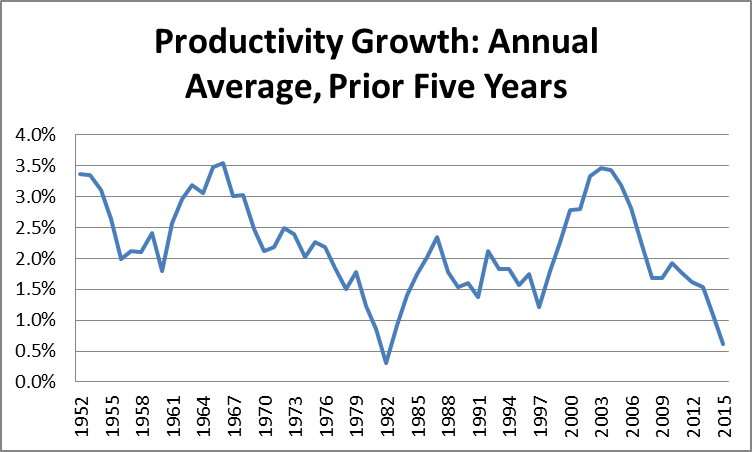January 13, 2017
It really is shameful how so many people, who certainly should know better, argue that automation is the factor depressing the wages of large segments of the workforce and that education (i.e. blame the ignorant workers) is the solution. President Obama takes center stage in this picture since he said almost exactly this in his farewell address earlier in the week. This misconception is repeated in a Claire Cain Miller’s NYT column today. Just about every part of the story is wrong.
Starting with the basic story of automation replacing workers, we have a simple way of measuring this process, it’s called “productivity growth.” And contrary to what the automation folks tell you, productivity growth has actually been very slow lately.

Source: Bureau of Labor Statistics.
The figure above shows average annual rates of productivity growth for five year periods, going back to 1952. As can be seen, the pace of automation (productivity growth) has actually been quite slow in recent years. It is also projected by the Congressional Budget Office and most other forecasters to remain slow for the foreseeable future, so the prospect of mass displacement of jobs by automation runs completely counter to what we have been seeing in the labor market.
Perhaps more importantly the idea that productivity growth is bad news for workers is 180 degrees at odds with the historical experience. In the period from 1947 to 1973, productivity growth averaged almost 3.0 percent, yet the unemployment rate was generally low and workers saw rapid wage gains. The reason was that workers had substantial bargaining power, in part because of strong unions, and were able to secure the gains from productivity growth for themselves in higher living standards, including more time off in the form of paid vacation days and paid sick days. (Shorter work hours sustain the number of jobs in the face rising productivity.)
The unionization rate has plummeted over the last four decades, but this is the result of policy decisions, not automation. Canada, a country with a very similar economy and culture, had no remotely comparable decline in unionization over this period.
The unemployment rate and overall strength of the labor market is also an important factor determining workers’ ability to secure their share of the benefits of productivity growth in wages and other benefits. When the Fed raises interest rates to deliberately keep workers from getting jobs, this is not the result of automation.
It is also not automation alone that allows some people to disproportionately get the gains from growth. The average pay of doctors in the United States is over $250,000 a year because they are powerful enough to keep out qualified foreign doctors. They require that even established foreign doctors complete a U.S. residency program before they are allowed to practice medicine in the United States. If we had a genuine free market in physicians’ services every MRI would probably be read by a much lower paid radiologist in India rather than someone here pocketing over $400,000 a year.
Similarly, automation did not make our patents and copyrights longer and stronger. These protectionist measures result in us paying over $430 billion a year for drugs that would likely cost one tenth of this amount in a free market. And automation did not force us to institutionalize rules that created an incredibly bloated financial sector with Wall Street traders and hedge fund partners pocketing tens of millions or even hundreds of millions a year. Nor did automation give us a corporate governance structure that allows even the most incompetent CEOs to rip off their companies and pay themselves tens of millions a year.
Yes, these and other topics are covered in my (free) book Rigged: How Globalization and the Rules of the Modern Economy Were Structured to Make the Rich Richer. It is understandable that the people who benefit from this rigging would like to blame impersonal forces like automation, but it just ain’t true and the people repeating this falsehood should be ashamed of themselves.







Comments